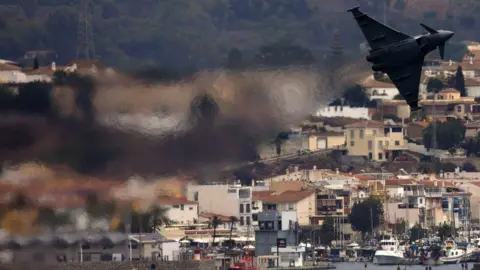Airbus and Dassault join forces to build next fighter aircraft
 Getty Images
Getty ImagesRivals Airbus and Dassault Aviation have struck a deal to develop and produce Europe's next generation of fighter aircraft.
Franco-German Airbus is part of the consortium behind Eurofighter, while France's Dassault makes the Rafale jet.
The two companies said their European Future Combat Air System (FCAS) would replace the existing planes by 2040.
They said the deal would secure European sovereignty and technological leadership in military aviation.
The French and German governments have yet to set out their exact requirements for the programme, which will also include the manufacture of drones and communications technology. And the two companies have yet to decide which of them would take the lead role in the huge project.
Airbus Defence and Space chief executive Dirk Hoke said that whether the French and German governments involve Britain in future projects would likely depend on the conditions around its exit from the European Union.
BAE Systems, Britain's biggest manufacturer, is a key part of the Eurofighter consortium.
Mr Hoke said: "Never before has Europe been more determined to safeguard and foster its political and industrial autonomy and sovereignty in the defence sector.
"Airbus and Dassault Aviation have absolutely the right expertise to lead the FCAS project. Both companies are already cooperating successfully on Europe's medium altitude long endurance new generation drone programme."
It will "complement and eventually replace" current generation of Eurofighter and Rafale fighter aircraft by 2035-2040.
Mr Hoke said timescale was tight, so the two firms needed to start working together immediately. "It is therefore of key importance that France and Germany launch an initial joint study this year to address this task."
Dassault's chief executive, Eric Trappier, said it was important that Europe did have have to rely on buying equipment from the US.
"I don't feel that if other European countries buy off-the-shelf American products that you contribute to strategic autonomy," he said.
Mr Trappier told reporters that the future fighter would not be a copy of the US military's F-35 jet, but would be more ambitious. F-35-maker Lockheed Martin is trying to sell what is currently the world's most advanced fighter to Germany.
BAE Systems said it was keen to further develop Britain's combat air capability and would welcome the chance to discuss cross-nation cooperation.
A spokesperson said: "We welcome debate about the need for next generation combat air systems across many nations. We have a strong history of collaboration with other nations and continue to invest in new technologies so we can develop aircraft of the future."

Analysis: Theo Leggett, BBC business correspondent
This agreement is all about politics, and the strengthening bond between France and Germany in the wake of Britain's decision to leave the EU.
Last year, President Macron and Chancellor Merkel said the two countries would work together to build a new fighter, and this agreement is the first step towards that goal.
The aim is to collaborate on developing a Future Combat Air System - an integrated mechanism involving not just fighters, but drones and other systems, all linked by secure communications. The political will is such that it has brought together two companies - Airbus and Dassault - which have historically been rivals.
The big question is what it means for the UK's BAE Systems - which is a major shareholder in Eurofighter alongside Airbus, and is currently developing an unmanned fighter with Dassault.
The shadow of Brexit certainly looms large, and there is a risk BAE could be left in the cold.
But analysts suggest there could still be room for the UK contractor in a wider European partnership, if political circumstances allow it.

